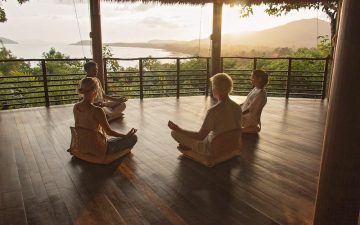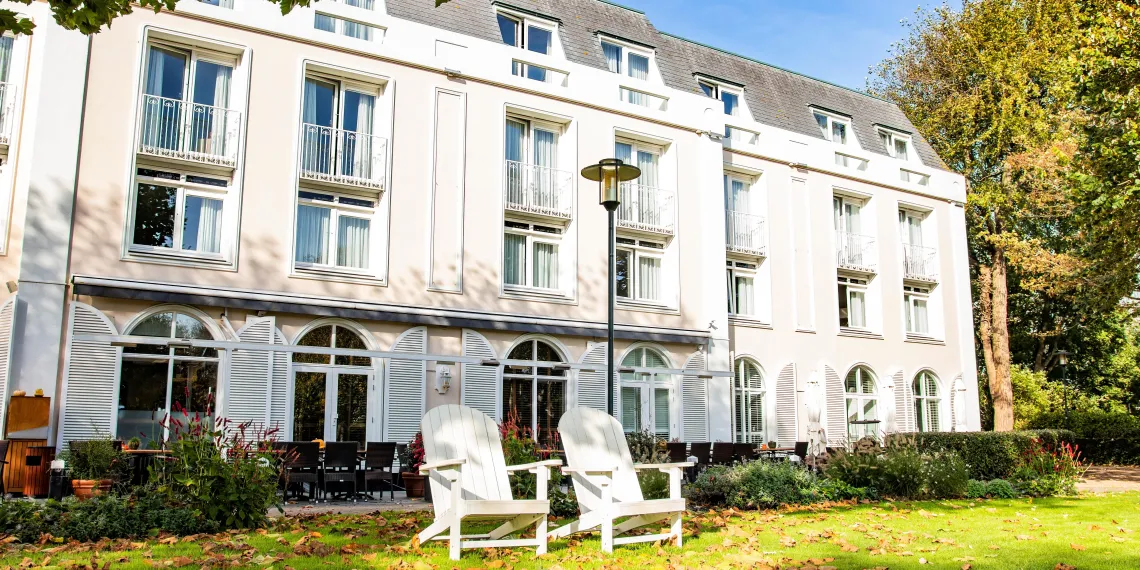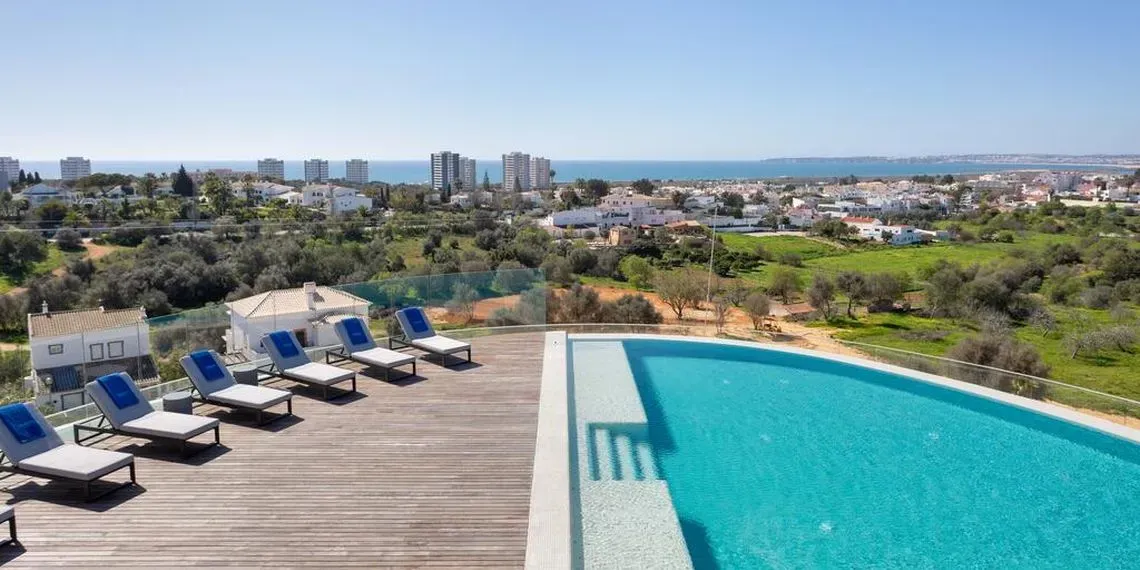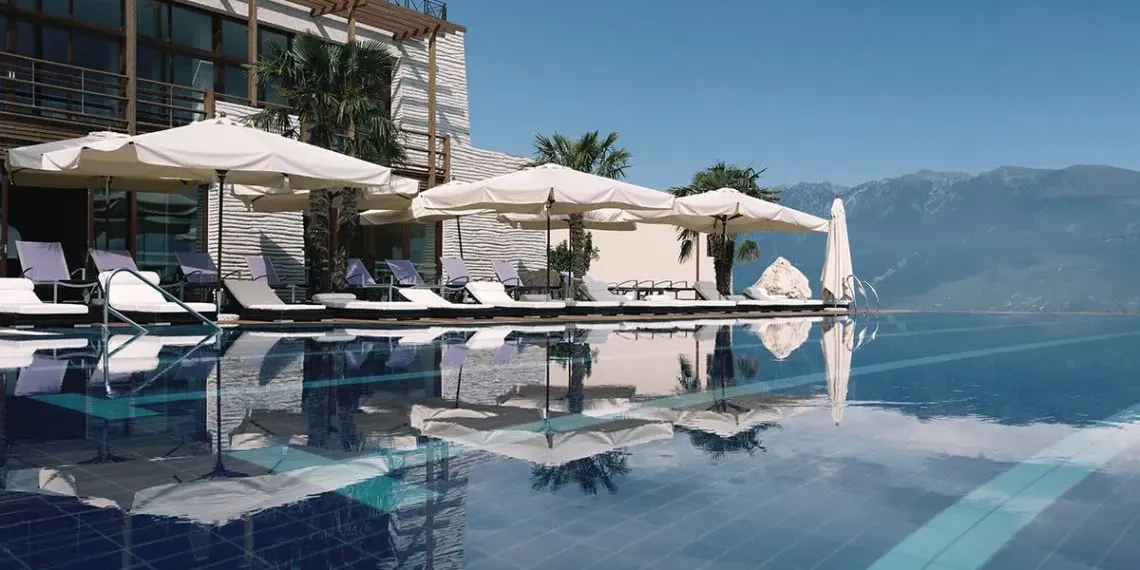Luxury Stress Relief Retreats
Insiders tips



Discover all our Stressmanagement holidays

Slow down, breathe, and move in the heart of nature. This forest yoga weekend helps you release stress and reconnect with yourself through gentle movement, silence and the healing presence of trees

Breathe deeper, move freely, and unwind by the sea. Our yoga weekends offer space for rest, connection and renewal, guided by nature, mindful movement and calming stillness

Experience deep relaxation, stress relief and renewed vitality through massages, mindfulness and holistic wellness

Relax and restore at Zulal Wellness Resort with programmes that bring back balance and energy through spa, mindfulness and holistic care.
Improve your health with detox and weight loss programmes combining nutrition, exercise and treatments.

Tap into Bali’s sacred energy with gentle wellness rituals to awaken the senses and support emotional and physical renewal
Restore body, mind and spirit through Balinese healing, energy work and body rituals. A deeply grounding and harmonizing retreat

Deepen inner stillness and creative flow with exclusive retreat therapies, wellness treatments and a personal guide. Including full plant-based meals

Release tension and recharge. From short boosters to programmes focused on renewal and vitality, here you will find ultimate relaxation

With yoga, meditation, therapies, and mindful eating, this stay helps you reset, regain clarity, and find strength to move forward in life with purpose

Take time for yourself, slow down and truly relax. These relaxation programmes calm body and mind and help you let go


Retreats for emotional balance, restful sleep, and stress relief. Mindfulness, yoga, and holistic therapies restore clarity, calm, and resilience

Recharge and relax with spa therapies, breathwork and calming rituals.

Created to restore emotional balance and mental clarity. These retreats focus on stress reduction, nervous system regulation and reconnecting with calm, focus and emotional resilience.
Yoga-focused retreat centred on mindful movement, breathwork and awareness. Suitable for deepening body–mind connection, improving flexibility and cultivating presence and inner stability.

Recover from stress, poor sleep or emotional or physical issues in a calm setting. Yoga, meditation, nutrition and therapy help restore inner peace and balance

Enhance your wellbeing with massages, consultations, rituals and spa access. For more calm, energy and a healthy lifestyle

In need of relaxation and renewed energy? Discover programmes that help you slow down, recharge, and restore balance – bringing more calm, clarity, and lightness into your daily life
In a world full of stimuli and responsibilities, mental resilience is essential. Whether you want to manage stress, improve your focus, or are in need of deep relaxation, here you'll find programmes designed to help you unwind

Boost mental resilience through coaching, neurotherapy and deep relaxation

Achieve inner peace with three programmes focused on sleep, stress relief, and meditation. Ideal for burnout, insomnia, anxiety, or emotional imbalance. A path to clarity, focus, and full-body calm.

This programme supports emotional reset, deeper rest and improved resilience. Perfect for anyone feeling overwhelmed or needing space to recover and recharge during their stay

Regain calm and emotional balance with expert-led mindfulness and relaxation.

Not ready to commit to a programme? Book your stay your way and personalise your SHA journey on-site with help from the expert team
Designed for high performers, this intensive plan strengthens body and mind using both scientific and holistic treatments to boost energy and resilience

Restore emotional balance and mental clarity with therapy, mindfulness and healing practices.

Unwind and recharge with programmes designed to reduce stress and restore balance. With medical guidance, coaching, and relaxation therapies, both body and mind are supported

Whether you seek deeper sleep, more energy, inner balance or stress relief, these tailored journeys calm the mind, recharge the body, and renew your sense of wellbeing.

Five serene programmes for sleep, connection, pregnancy and relaxation – all designed to restore peace, vitality and the Joy of Weightlessness

Prevent burnout and restore your mental balance. Designed for those with demanding schedules, this seven-day retreat offers stress reduction, energy recovery and improved mental resilience

Designed for high performers, this intensive plan strengthens body and mind using both scientific and holistic treatments to boost energy and resilience
The Best Retreats for Stressmanagement
Have you ever wondered why the modern hustle leaves so many of us perpetually clenching our jaws from stress? Or why, in our pursuit of stress relief, we often end up increasing our discomfort? It's an age-old story: chronic stress, the silent killer, quietly contributes to ailments like heart disease, cancer, and depression. It's time to say goodbye to stress, with your only challenge being how to do it. Stress is a reaction we can learn to manage better, navigate through challenges, and even turn to our advantage. In this stress-filled world, PureandCure offers Health and wellbeing hotels and spas to offer programs tailored to your needs.
Managing stress isn't just about finding calm in the chaos; it's essential for maintaining overall health. Allowing stress to dominate opens the door to severe health issues, from heart disease to strokes and diabetes. The stakes are high, and that's why investing in stress management retreats isn't just a luxury—it's a vital step towards your well-being.
On a stress management holiday, the emphasis is on activities and experiences that promote relaxation and stress reduction. These can vary depending on personal preferences, but some common features of a stress management holiday may include:
- Natural surroundings: Many stress management holidays take place in serene and peaceful environments, such as beach resorts, spa retreats, or secluded countryside locations. Being surrounded by nature can have a calming effect and help individuals disconnect from their usual stressors.
- Spa treatments and therapies: Spa treatments, such as massages, facials, and aromatherapy, are often an integral part of stress management holidays. These treatments help to relax the body, release tension, and promote a sense of well-being.
- Mindfulness and meditation: Practices like mindfulness meditation, yoga, or tai chi are frequently incorporated into stress management holidays. These activities focus on cultivating present-moment awareness, reducing anxiety, and promoting mental clarity and relaxation.
- Healthy and balanced meals: Stress management holidays often emphasize nutritious and well-balanced meals. Eating healthily can contribute to physical well-being and provide the body with the necessary nutrients to cope with stress.
- Physical activities: Engaging in physical activities can help relieve stress and increase endorphin levels. Depending on the location, stress management holidays may include activities such as hiking, swimming, yoga classes, or nature walks.
- Digital detox: Disconnecting from technology and taking a break from constant connectivity is becoming more popular in stress management holidays. This allows you to focus on self-care, be present in the moment and reduce the influence of digital stressors.
When is the time to go on a health holiday
A de-stress holiday can be taken whenever you feel overwhelmed, exhausted, or in need of a break from the demands of everyday life. Here are a few situations when people often consider taking a de-stress holiday:
- High levels of work-related stress: If you're experiencing significant work-related stress, such as long hours, tight deadlines, or a demanding workload, a de-stress holiday can provide a much-needed break to recharge and prevent burnout.
- Major life transitions: Significant life events, such as moving to a new city, starting a new job, or going through a divorce, can cause stress and emotional strain. Taking a de-stress holiday during these periods can help you process the changes and regain a sense of balance.
- Personal loss or grief: Coping with the loss of a loved one or going through a difficult emotional period can take a toll on your mental and physical well-being. Taking a de-stress holiday can give you time and space to heal, reflect, and find solace.
- Accumulated stress and fatigue: If you've been experiencing ongoing stress, feeling exhausted, or noticing signs of physical and mental fatigue, it may be a good time to consider a de-stress holiday. Taking a break can help you restore your energy levels and replenish your overall well-being.
- Lack of work-life balance: When work, responsibilities, and obligations start to dominate your life, and you find it challenging to find time for relaxation and self-care, a de-stress holiday can help you regain perspective and prioritize your well-being.
Remember, the need for a de-stress holiday is subjective, and everyone's threshold for stress and coping mechanisms may differ. It's essential to listen to your body and mind, recognize the signs of burnout or excessive stress, and proactively take steps to manage and alleviate it.
Burnout prevention
More and more people are saying that they’re struggling to tolerate the stresses of today’s life. Figures from the Dutch Central Bureau for Statistics show that no less than one in eight employees suffers from burnout complaints. These complaints vary from emotional exhaustion, digestive issues and extreme tiredness to irritability, sleeplessness, broken concentration and high blood pressure. Depression, anxiety and memory problems also occur. Burnouts commonly affect those with perfectionist tendencies who set the bar high for themselves. For these people, a hectic time at work – with deadlines to meet or understaffing, for example – can result in burnout. Complete exhaustion is the consequence.
Who are burnout holidays for?
“At the moment, it is mostly those with very demanding jobs – managers and business owners – who are choosing for a burnout holiday as a means of recovering from their hectic lives, in isolation from the rest of the world.” Comments Marleen van Griensven, director at Puurenkuur. “They book this type of holiday to be able to relax their mind and body in a calming location; to take stock. Yet people’s awareness of the importance of a healthy work-life balance in today’s society is growing.” A burnout holiday is therefore a holiday in a luxury health resort for anyone who is feeling simply too pressured, and who wants to avoid this escalating into exhaustion and burnout.
Health Resorts, Retreats and Clinics around Mental Balance
In our demanding world, the importance of mental balance has evolved from a mere desire into an absolute necessity. Mental balance represents the harmony that encompasses our thoughts, emotions and actions. It is the key to unlocking a life characterized by resilience, clarity, and inner peace. Achieving mental balance requires equilibrium across our emotional, psychological, and physical well-being. Discover our wide offer in programs and retreats designed to nurture your mental equilibrium, reduce stress, enhance focus, and bolster emotional strength. There are various types of mental balance retreats: stressmanagement, emotional healing or burnout recovery. Being in Nature and mindfulness and mediation are key elements too. Mental balance programs are crafted by experts such as psychologists, holistic therapists, medical professionals, or individuals with substantial experience in this field. Beyond the goal of genuine rejuvenation, these programs also provide insights into the underlying causes of stress and burnout. Healthy nutrition is essential, as are relaxing treatments and holistic activities like Yoga, Tai Chi, Pilates, Qi Gong, Mindfulness, meditation, acupuncture, or Ayurveda.
We have listed the various types of mental balance programs aimed at achieving greater peace and tranquility in your mind
1. Anti-stress (or Stress Management) Getaways
These programs are designed to help you reduce stress levels and learn effective techniques to manage stress in your daily life. They often include relaxation exercises, treatments, massages, and stress-reduction strategies. Numerous Health and Wellbeing resorts offer specialized programs centered around stress reduction.2. Emotional Healing Retreats
These retreats provide a safe and supportive environment for addressing and working through emotional issues, traumas, and experiences that can lead to significant life changes, such as divorce, illness, or the loss of a loved one. These programs often include therapy, coaching sessions, and various healing practices. Emotional healing doesn't mean erasing past experiences but learning to cope with them, fostering resilience, and ultimately finding a sense of inner peace and balance. As such, an emotional healing program offers you a new perspective and newfound energy.3. Burnout Recovery Programs
These programs are specially crafted for guests who are grappling with burnout, often stemming from overwhelming work-related stress. They concentrate on recovery, establishing boundaries, self-care, and imparting techniques to avert future instances of burnout. The goal is to enable you to disconnect from daily stressors, focus on your well-being, create and develop strategies to prevent future burnout.4. Reconnecting with Nature
Spending time in nature offers therapeutic benefits for your mental well-being. Health and well-being resorts that focus on nature-based experiences encourage you to immerse yourself in the outdoors and connect with the natural world such as mountains, national parks, lakes, beaches or the countryside. These settings are ideal for activities like hiking, walking, forest bathing, and cycling. Being in nature has a calming and rejuvenating effect on the mind, helping to reduce stress.5. Mindfulness and Meditation
To reset your stress management patterns, begin by identifying the triggers of stress. You can cultivate healthier coping mechanisms, such as deep breathing, exercise, and mindfulness. Meditation, a mindfulness practice, helps you quiet your mind and gain self-insight. This can assist you in effectively managing your stress, confronting challenges, and exploring alternative perspectives. PureandCure offers a range of meditation and mindfulness weekend retreats and short programs designed to teach you how to be present in the moment, reduce anxiety and find balance.6. Unplugging from screens on a Digital Detox
Digital detox programs encourage you to take a break from excessive screen time and technology use. Cutting back on screen time can supercharge your sleep quality and boost your overall well-being. Plus, it paves the way for more vibrant real life connections and relaxation.What is the main difference between anti-stress, emotional healing and burnout recovery?
It is a frequently asked question we receive from our guests. Each program is designed to address various aspects of mental and emotional well-being. The primary distinctions lie in the methods of support and guidance offered during each program.While anti-stress programs primarily emphasize relaxation treatments to relax and unwind, emotional healing and burnout recovery programs incorporate coaching sessions and therapies that are specifically tailored to provide the emotional support that you need.
Emotional healing is a vital process of addressing and mending emotional wounds and traumas. It involves acknowledging and processing difficult feelings like grief, anger or fear. Healing often requires self-compassion, therapy, and mental support. By confronting and understanding the root causes of emotional pain, you can gradually release and begin to rebuild your emotional well-being.
A burnout recovery program is a tailored intense program aimed at helping you to overcome physical and emotional exhaustion caused by prolonged stress. These programs offer a supportive environment for self-reflection and personal growth, emphasizing work-life balance and fostering a sense of community among guests.
Elements of a mental balance holiday
All those programs share some common elements, such as mindfulness practices or relaxation techniques, but the objective, needs and target audience vary. Choosing the right program depends on your specific needs and circumstances, whether it's managing everyday stress, addressing emotional issues, or recovering from burnout.- Healthy eating. During times of stress, it's common to turn to coffee, alcohol, fatty snacks, sugar, and nicotine for solace, albeit understandably. However, these substances only serve to heighten adrenaline levels in the body, exacerbating the turmoil. Conversely, healthy food is a potent ally against stress. Hence, an anti-stress holiday educates participants about adopting a proper, nourishing diet.
- Relaxation treatments and holistic activities. These are integral to a stress management holiday. Practices such as yoga, tai chi, Pilates, qi gong, mindfulness, meditation, acupuncture, and Ayurveda play vital roles in restoring the delicate balance between body and mind, fostering a more tranquil lifestyle. Furthermore, these activities provide a gentle physical component to your wellness journey, grounding individuals who may find themselves excessively caught up in their thoughts.
- Therapy and counseling. Individual and group therapy sessions with licensed therapists or counselors to address specific mental health concerns, emotional issues, and personal growth.
- Nature and Outdoor Activities. Opportunities for nature-based activities such as hiking, nature walks, or eco-therapy to connect with the natural environment and reduce stress.
- Creative and Artistic Expression. Art therapy, creative workshops, or music therapy sessions to encourage self-expression and emotional release.
- Workshops and Educational Seminars. Workshops and seminars on topics like stress management, emotional intelligence, resilience building, self-awareness, personal growth, and reflection. Some place offer personalized assessments to identify your areas of concern and create a tailored plan.
- Healthy Lifestyle Choices. Guidance on making healthier lifestyle choices, including sleep hygiene, exercise, and time management.
Consider approaching your employer for support or accounting these expenses as business costs.
Research demonstrates that engaging in a mental balance program can reduce absenteeism and potentially increase an employee's productivity. This is why employers are sometimes willing to contribute. For entrepreneurs or self-employed individuals, coaching costs can be classified as business expenses and, thus, tax-deductible.

 EN
EN NL
NL BE
BE







